How effective are international diplomacy and civic advocacy in countering human rights abuses?
Iran and Cuba offer two prime opportunities where the Biden administration can prioritize human freedom by making sanctions relief contingent on human-rights improvement, argues Russell A. Berman, a senior fellow at the Hoover Institution and Professor of the Humanities at Stanford University. The United States has the leverage; the dictators of the world need it more than it needs them. Therefore, any sanctions relief should be premised on prior and significant improvement in the respective rights environments, he writes for the National Interest:
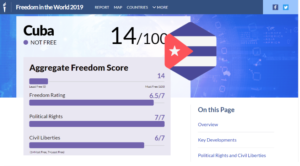 According to Amnesty International, the Cuban government continues long-standing practices to limit dissent. Press freedom and freedom of expression remain nonexistent or subject to harsh restrictions. … Decree 349, adopted in late 2018, prohibits the gatherings of artists without prior permission of the Ministry of Culture, and participants in such gatherings face arrest. Currently, the San Isidro Movement of artists is encountering particular repression, with some of their members detained incommunicado.
According to Amnesty International, the Cuban government continues long-standing practices to limit dissent. Press freedom and freedom of expression remain nonexistent or subject to harsh restrictions. … Decree 349, adopted in late 2018, prohibits the gatherings of artists without prior permission of the Ministry of Culture, and participants in such gatherings face arrest. Currently, the San Isidro Movement of artists is encountering particular repression, with some of their members detained incommunicado.
The Biden administration has the chance to condition liberalization of restrictions on travel to Cuba and on meaningful reforms, such as a revocation of Decree 349 as well as similar legislation and policies that restrict freedom of expression, Berman adds.
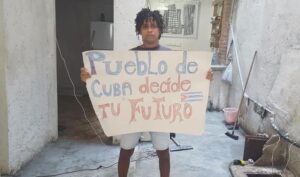 The World Movement for Democracy today condemned Cuban authorities’ arrest of activist and artist Denis Solís Gonzalez (right), a member of the San Isidro Movement (MSI), a group of artists, poets, LGBTI activists, academics, and independent journalists who advocate for freedom of expression in Cuba. His affiliation with MSI has made him a target for authorities, who are cracking down on dissent in a new wave of restrictions and surveillance operations in the country. His arrest highlights strategic repressive techniques such as arbitrary arrests, evictions, mobile data cuts, and violence used by Cuban authorities to harass activists. Solís’ detainment has received widespread international criticism. Prominent human rights organizations including Human Rights Watch, Freedom House, Pen America, Amnesty International, Cultura Democrática, and Article 19 have released statements of condemnation.
The World Movement for Democracy today condemned Cuban authorities’ arrest of activist and artist Denis Solís Gonzalez (right), a member of the San Isidro Movement (MSI), a group of artists, poets, LGBTI activists, academics, and independent journalists who advocate for freedom of expression in Cuba. His affiliation with MSI has made him a target for authorities, who are cracking down on dissent in a new wave of restrictions and surveillance operations in the country. His arrest highlights strategic repressive techniques such as arbitrary arrests, evictions, mobile data cuts, and violence used by Cuban authorities to harass activists. Solís’ detainment has received widespread international criticism. Prominent human rights organizations including Human Rights Watch, Freedom House, Pen America, Amnesty International, Cultura Democrática, and Article 19 have released statements of condemnation.
This question will be the focus of the first debate to be held in the Villa Decius Debate Series, a dialogue initiative of Villa Decius Association in co-operation with New Diplomacy, with support from the National Endowment for Democracy (NED). The debate will be moderated by New Diplomacy Chair, Jeff Lovitt, and the panellists include President of the Board of Villa Decius Association (and New Diplomacy co-founder) Jan Piekło, as well as Ales Bialackij, President of Human Rights Centre “Viasna” (“Spring”), Belarus, Anna Sevortian, Executive Director, EU-Russia Civil Society Forum, and Marian Turski, Deputy Chairman, Association of the Jewish Historical Institute of Poland (tbc).
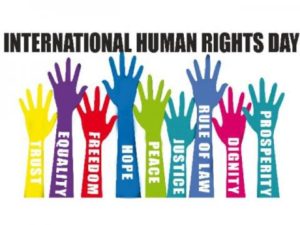 Advancing an effective U.S. human rights policy will be a crucial and formidable challenge for the Biden administration, the Carnegie Endowment writes. To mark #HumanRightsDay 2020, the Endowment and the Open Society Foundations invite you to a special symposium (above). with EU Special Representative for Human Rights Eamon Gilmore; former U.S. Ambassador to South Africa Patrick Gaspard, president of the Open Society Foundations; former UN Special Rapporteur on the Rights to Freedom of Peaceful Assembly and of Association Maina Kiai; Marta Pardavi, co-chair of the Hungarian Helsinki Committee; and Karen Attiah, Washington Post global opinions editor, to address three major questions.
Advancing an effective U.S. human rights policy will be a crucial and formidable challenge for the Biden administration, the Carnegie Endowment writes. To mark #HumanRightsDay 2020, the Endowment and the Open Society Foundations invite you to a special symposium (above). with EU Special Representative for Human Rights Eamon Gilmore; former U.S. Ambassador to South Africa Patrick Gaspard, president of the Open Society Foundations; former UN Special Rapporteur on the Rights to Freedom of Peaceful Assembly and of Association Maina Kiai; Marta Pardavi, co-chair of the Hungarian Helsinki Committee; and Karen Attiah, Washington Post global opinions editor, to address three major questions.
- First, what are the most important changes and challenges human rights activists around the world face today?
- Second, what new approaches, priorities, and partners should the Biden administration pursue to rebuild U.S. credibility on human rights?
- How can enhanced transatlantic cooperation on human rights be part of the new picture?
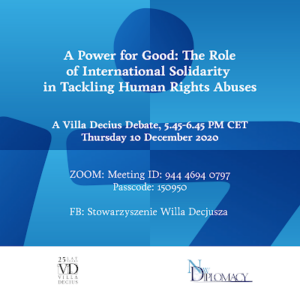 The GLOBSEC debate, to take place online (ZOOM ID: 944 4694 0797 password: 150950) from 17.45-18.45 CET on Thursday 10 December 2020, will examine tools and policies that have worked as well as the limitations of international solidarity. The panellists will also look at the lessons arising from failures to stand firm in the face of human rights abuses, not least in terms of genocide/ethnic cleansing and the use of state security services to quash human rights.
The GLOBSEC debate, to take place online (ZOOM ID: 944 4694 0797 password: 150950) from 17.45-18.45 CET on Thursday 10 December 2020, will examine tools and policies that have worked as well as the limitations of international solidarity. The panellists will also look at the lessons arising from failures to stand firm in the face of human rights abuses, not least in terms of genocide/ethnic cleansing and the use of state security services to quash human rights.
The debate is held as part of the awards ceremony for this year’s Polish Prize of Sérgio Vieira de Mello, the UN High Commissioner for Human Rights (2002-2003). The panellists will include laureates from this year’s prize and other practitioners in human rights, diplomacy and democracy promotion who will assess the potential and limitations of international solidarity and tools of diplomacy in the current context of the police clampdown against peaceful protesters in Belarus. They will also examine the scope for countering threats to human rights in Crimea, Eastern Ukraine and Nagorno-Karabakh.
A Power for Good: The Role of International Solidarity in Tackling Human Rights Abuses?
The inaugural Debate in the Villa Decius Debate Series, a dialogue initiative of Villa Decius Association in co-operation with NEW DIPLOMACY. 17.45-18.45 CET on Thursday 10 December 2020
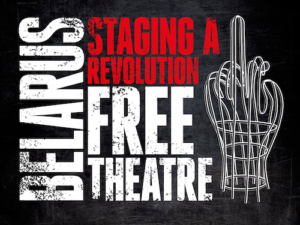
Credit: BFT
Panellists:
ALES BIALACKIJ, President, Human Rights Centre “Viasna” (“Spring”), Belarus
MARIAN TURSKI, Deputy Chairman, Association of the Jewish Historical Institute of Poland (tbc)
ANNA SEVORTIAN, Executive Director, EU-Russia Civil Society Forum
JAN PIEKŁO, President of the Board of Villa Decius Association/former Ambassador of Poland to Ukraine
Moderator:
JEFF LOVITT, Chair, New Diplomacy
=================================
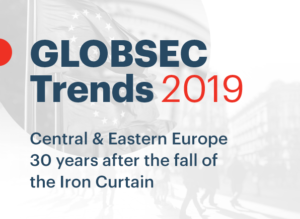 ZOOM ID: 944 4694 0797 password: 150950 or Villa Decius Facebook channel: https://www.facebook.com/WillaDecjusza/
ZOOM ID: 944 4694 0797 password: 150950 or Villa Decius Facebook channel: https://www.facebook.com/WillaDecjusza/
=================================
Laureates, 2020, of Polish Prize of Sérgio Vieira de Mello:
- Human Rights Centre “Viasna” (“Spring”) from Belarus (Ales Bialackij – President),
- Hussein Alqaidi from Iraq (Office of Rescuing Kidnapped Y(azidis))
- Marian Turski, Deputy Chairman, Association of the Jewish Historical Institute of Poland







